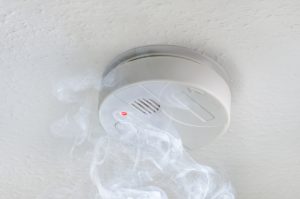 The first full week of February is designated as Burn Awareness Week. Jamaica Hospital Medical Center is taking this opportunity to educate the community about ways to prevent burns in the home.
The first full week of February is designated as Burn Awareness Week. Jamaica Hospital Medical Center is taking this opportunity to educate the community about ways to prevent burns in the home.
One of the best ways to prevent burns from occurring at home is to prevent fires. Being aware of the causes of residential fires and learning how to avoid these issues.
The biggest culprits for at-home fires are space heaters and cooking accidents. Space heaters are the number one cause of winter fire deaths. They are used commonly in apartments, homes and dorms. Therefore, it is important to know how to properly use these devices. Here is a guide:
- Make sure to thoroughly read the directions for every new space heater you buy, as some directions may vary. When purchasing a space heater, look for a certification from an approved source, such as Underwriters Laboratories, the leading independent safety testing organization.
- Never plug a space heater into an extension cord. Space heaters should only ever be plugged directly into a wall outlet. This is because space heaters generate so much energy, that it can overload the power strip and cause a fire.
- Make sure the space heater is placed somewhere safe in your home, meaning at least three feet away from other flammable objects, such as loose paper, curtains, furniture, boxes, etc. Space heaters should not be placed on top of carpets, as this can generate too much electricity and cause a burn or fire.
- Never block an entrance or exit path with a space heater, in the unfortunate situation that a space heater does go on fire, this can prevent you from leaving the site.
- Never leave a space heater on and unattended, this includes leaving a space heater on when you go to sleep. This is very dangerous and contributes to the majority of fires occurring when people are asleep. Leaving a space heater on and too close to your body can lead to an injurious burn on your body as well.
Cooking accidents are the number one cause of home fires year-round. In fact, 47% of home fires are due to cooking incidents. Here are a few cooking safety tips to help reduce the risk of injury:
- Make sure you cook when you are wide awake and in the right state of mind to handle sharp items, fire, and gas.
- Make sure to clean up your stove from grease build up to prevent fires from starting. In the event of a grease or oil fire, water will not eliminate the fire. In these situations, it is best to cover the pot with a lid or large tray and turn off the heat, as water will make the situation worse.
Although space heaters and cooking accidents are among the leading causes of home fires, it is also important to keep in mind the dangers of electrical fires- the third leading cause of fires. Here are a few precautions you can follow to keep your home safe:
- Do not use appliance or devices with frayed or cracked electrical cords
- Do not plug any items that generate heat or cool air, such as a space heater, microwave, and refrigerator, into an extension cord or a multi-plug adaptor. By plugging too many electricity generating items, one runs the risk of overwhelming the outlet and creating a fire. Best practice is to plug these items directly into the wall outlet.
It is important to have a working smoke detector and carbon monoxide alarm in your home as 70% of fire deaths have occurred in homes that do not have working carbon monoxide alarms or smoke alarms. Both devices serve as early warnings in the event there is a fire in your home. The batteries for these items should be changed twice a year. A great way to remember to change the batteries is to do so when daylight saving time begins and ends, change your clocks change your batteries.
If you are interested in having a free fire, burn, or home safety presentation for your group or organization, please contact the Trauma Department, Injury Prevention, at Jdennehy@jhmc.org.
All content of this newsletter is intended for general information purposes only and is not intended or implied to be a substitute for professional medical advice, diagnosis or treatment. Please consult a medical professional before adopting any of the suggestions on this page. You must never disregard professional medical advice or delay seeking medical treatment based upon any content of this newsletter. PROMPTLY CONSULT YOUR PHYSICIAN OR CALL 911 IF YOU BELIEVE YOU HAVE A MEDICAL EMERGENCY.

